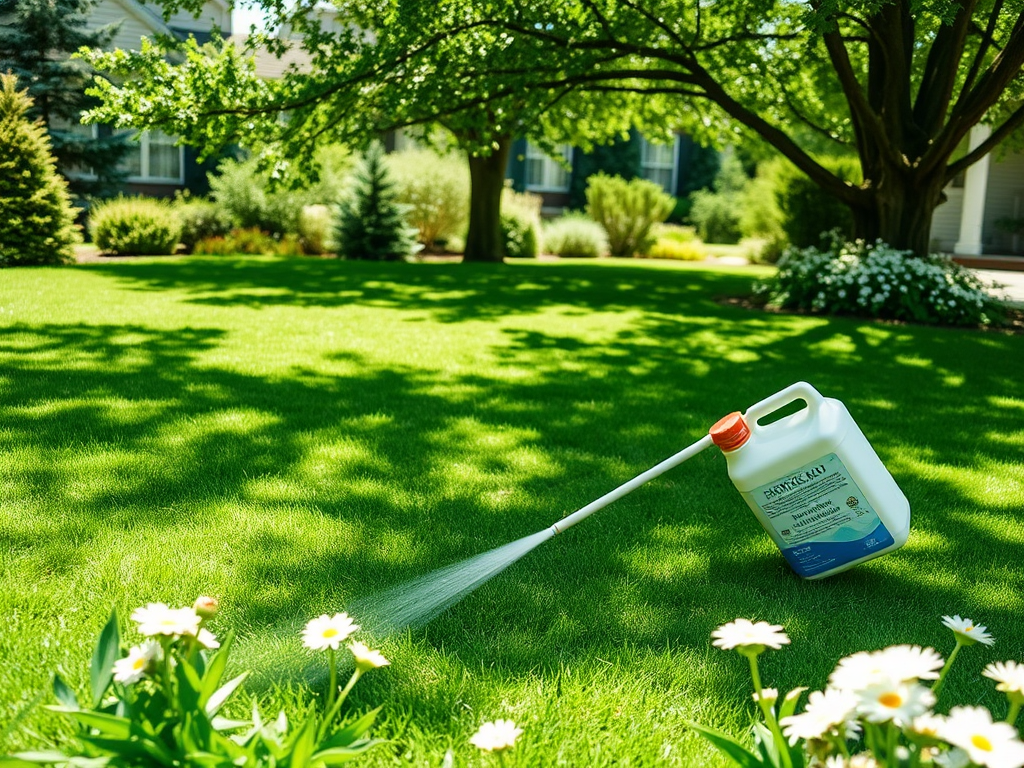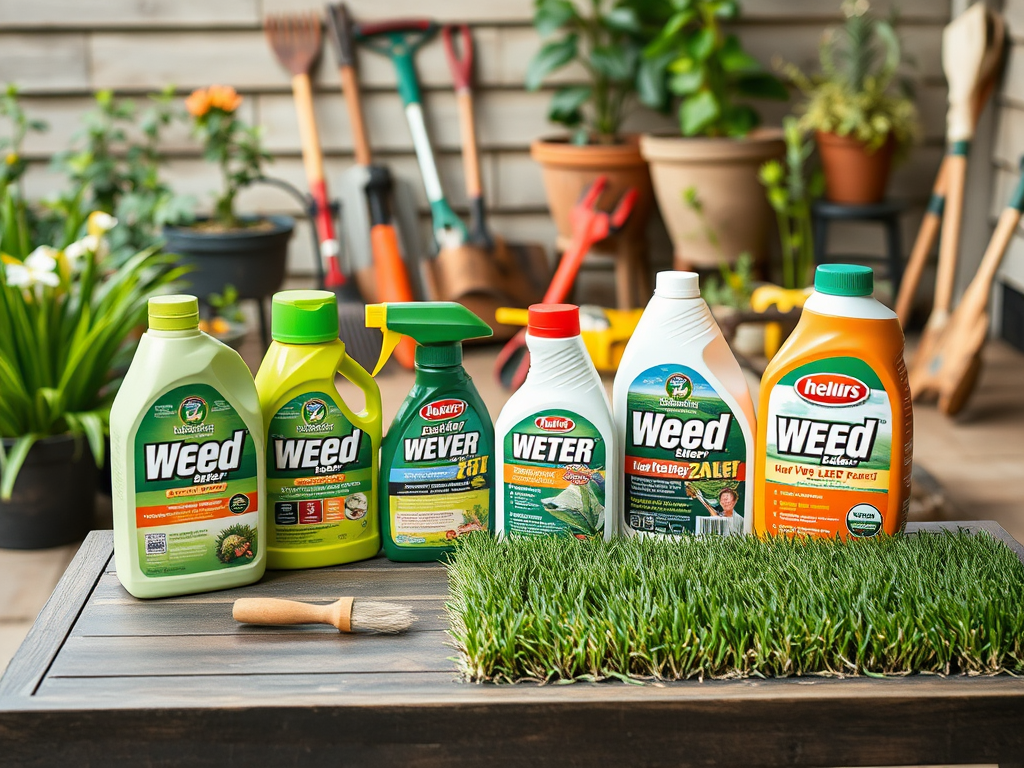In the quest for a lush, green lawn, one of the most persistent challenges homeowners face is the invasion of lawn weeds. These unwelcome guests can quickly ruin the aesthetic appeal of your yard, undermining all the effort you’ve put into cultivating healthy grass. Effective lawn care, therefore, hinges on understanding not only the types of weeds that threaten your lawn, but also the most effective methods for managing them. As homeowners become more environmentally conscious, choosing the right lawn weed killer has never been more crucial. This article explores the options available in 2025, helping you make informed decisions for effective weed control.
Why Lawn Weeds Are a Problem

Lawn weeds pose several issues that can detract from the beauty and health of your yard. They compete with your grass for sunlight, nutrients, and water, leading to a weaker and more sparse lawn. Additionally, weeds can harbor pests and diseases that may harm your grass and other plants. The presence of weeds can also affect the biodiversity of your garden, often replacing native plants that support local wildlife.
- Broadleaf Weeds: Includes dandelions and clover, which are larger and can be easier to spot.
- Grassy Weeds: Such as crabgrass and foxtail, that resemble your lawn grass but can outcompete it.
- Perennial vs. Annual Weeds: Understanding whether a weed is a perennial (comes back year after year) or an annual (dies after one season) helps in choosing the right control measures.
Importance of Choosing the Right Weed Killer

Choosing the right weed killer is crucial in achieving effective lawn care. A product that is too aggressive can harm your existing grass, while one that is too mild may fail to eliminate the weeds effectively. Furthermore, with an increasing number of products on the market tailored for specific types of weeds, it’s essential to do your research to find the best solution for your lawn’s unique conditions. Environmental factors, such as weather and soil type, should also be considered. Safety is another important aspect, as these chemicals can pose risks to pets, children, and local wildlife if not used properly.
Types of Lawn Weed Killers Available
In 2025, the market is flooded with various options for lawn weed killers, each designed to tackle different types of weeds and cater to diverse lawn care needs. Understanding these categories can greatly assist you in choosing the right one for your specific situation.
Pre-Emergent Herbicides
Pre-emergent herbicides are designed to prevent weeds before they sprout, targeting seeds and young plants. These products form a barrier in the soil and can be especially useful in controlling annual weeds. It is significant to apply them at the right time, typically in early spring or fall, depending on the region.
Post-Emergent Herbicides
Post-emergent herbicides are effective against existing weeds and work by penetrating the leaves to kill the plants from the inside out. They are ideal for tackling broadleaf weeds and grassy weeds that have already taken hold of your lawn.
Natural and Organic Options
As many homeowners seek eco-friendly alternatives, natural and organic weed killers have gained immense popularity. These products often utilize ingredients like vinegar or clove oil, making them safer for the environment and non-toxic around pets and children. However, their effectiveness can vary, and they may require more frequent applications compared to chemical options.
| Type of Weed Killer | Effectiveness | Safety |
|---|---|---|
| Pre-Emergent | High against annuals | Moderate |
| Post-Emergent | High against existing | Varies (check label) |
| Natural/Organic | Variable | High |
The Best Lawn Weed Killers of 2025
After evaluating numerous products available in the market today, we’ve highlighted some of the top-rated lawn weed killers of 2025. These selections are based on customer reviews, effectiveness, and overall usability.
- GreenGuard Weed Terminator: Features robust formula that targets both broadleaf and grassy weeds, ideal for diverse lawn conditions.
- EcoSafe Lawn Defender: An organic option known for its safety around children and pets, effective against common weeds.
- TurboWeed Rapid Kil: Versatile post-emergent herbicide with quick results, specifically designed for common residential lawns.
Tips for Effective Weed Control
Implementing effective weed control requires both patience and strategy. Timing is crucial; applying weed killer at the right moment can significantly enhance its efficiency. For instance, in the spring, preventing early weed growth sets the stage for a healthier lawn throughout the season.
Timing and Application
Applying herbicides during optimal weather conditions—preferably when it’s dry and calm—can make a significant difference. Post-emergent treatments may work best during a period of active weed growth, while pre-emergent killers are best applied early in the season.
Safety Precautions
Taking safety measures when using weed killers is essential. Always keep children and pets indoors during application and make sure to follow the product’s label instructions precisely. Wearing protective gear during application helps minimize any risks associated with exposure.
Conclusion
Effective lawn care hinges on understanding the challenges presented by lawn weeds and choosing the right products to manage them. By selecting the best lawn weed killers of 2025 and implementing practical strategies, you can cultivate a thriving, beautiful lawn. Remember to consider your lawn’s specific conditions, and always prioritize safety. With the right approach, a lush and vibrant lawn is within reach.
Frequently Asked Questions
- What is the best time of year to apply weed killer? Late spring or early fall is ideal, depending on the type of weeds.
- Are organic weed killers effective compared to chemical ones? They can be effective but often require more frequent applications and may not be as fast-acting.
- How do I know which type of weed killer is right for my lawn? Consider the types of weeds you have and the condition of your lawn when choosing a product.
- Can I apply weed killer to a newly sown lawn? It’s generally advisable to wait until your grass has established before applying weed killers.
- What should I do if I accidentally sprayed weed killer on my flower beds? Rinse the affected area with water immediately to dilute the chemical, and monitor the plants for signs of distress.
